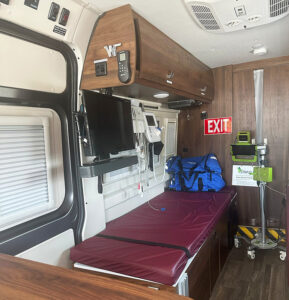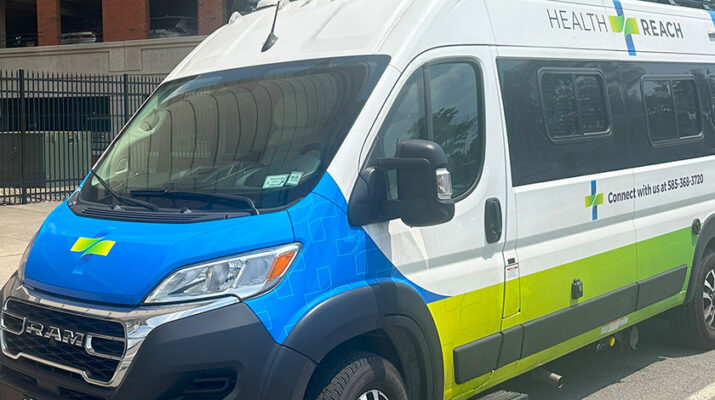By Mike Costanza

Medical care is often inaccessible to those living in Rochester’s shelters or on its streets. Regional Health Reach strives to solve that problem.
“Our goal is to provide quality and comprehensive care to help improve the health of those experiencing homelessness in Rochester and to really serve Rochester’s most vulnerable,” said physician Mike Hudson, the nonprofit’s CEO.
Though most of the independent federally qualified health center’s patients are on Medicaid, the Regional Health Reach treats everyone regardless of their insurance or lack of it.
It appears to have its work cut out for it.
According to a recent report from the New York State Comptroller, 1,506 people in the Rochester area were homeless in 2024, a 41% increase over 2022. Health Reach treated about 1,400 people in 2023 and more than 1600 in 2024.
Though Hudson believes that number will go up again this year, many people who are experiencing homelessness may not seek the treatment they need due to a lack of medical insurance, the inability to travel to treatment facilities or other factors. In some cases, mental health issues, drug abuse or other problems might prevent them from seeking the care they need, as might a history of poor treatment at the hands of providers, some of whom might look down upon them because of their statuses. Being homeless adds another hurdle.
“No one really cares about their blood pressure if they don’t have a roof over their heads, if they don’t know what food’s coming in,” Hudson said.
The resulting lack of access to medical care can have serious long-term consequences. Hudson tells the story of “Mary” (not her real name) who sought treatment from Health Reach after sleeping on the streets for nine months.
“She said, ‘Hey, I heard you guys were nice. I haven’t taken my socks off in nine months and I’m scared. Would you please help me take my socks off?’” he said.
Mary’s feet were badly infected, but because she suffered from diabetes, she couldn’t feel how painful they were. Health Reach’s medical professionals helped her obtain the care she needed and though she lost most of her toes, she kept her feet and legs and did not die from the wounds. Others who are experiencing homelessness don’t fare as well.
“People living out on the street die on average between 20 and 50 years earlier than people that are experiencing even sheltered homelessness, who themselves already face significantly shorter lifespans and significantly worse chronic disease conditions,” Hudson said.
Rochester Health Reach tackles that problem through a multi-pronged approach. Medical teams, which usually consist of a physician or nurse practitioner, a nurse and a social worker, regularly head to local homeless shelters to offer their residents a range of services.
“We provide comprehensive primary care,” Hudson said. “We will do everything from wound care, to suturing lacerations, to stabilizing folks to be sent to EDs, to the management of chronic disease.”
The teams also can refer patients to other treatment providers for more extensive care, help them access mental health and dental care and assist them with applying for medical insurance and housing opportunities.
For just more than a year, Health Reach’s medical teams have also ridden Rochester’s streets aboard two mini Mobile Medical Units in order to extend the nonprofit’s reach. The specially made vans are equipped with iPads that can translate a variety of languages, diagnostic equipment, medicines and medical supplies.
“It allows us to provide comprehensive care right there in the environment,” Hudson said. “We carry a lot of tools, so that if we need to do procedural interventions, we’re able to do those directly on the unit.”
The MMMUs also have showers and dispense free prepackaged breakfasts and lunches. Patients can undergo treatment in private, shower off, then leave with his or her medication, a referral to a regular medical care provider for additional treatment and a free meal. While MMMUs visit shelters, they also seek out and treat those who are living on Rochester’s streets.
Those in need of medical care or other assistance, including free food, can also head to Health Reach’s clinic on Rochester’s Monroe Avenue. If a patient needs medication, the nonprofit buys it, then dispenses the medication at its clinic or transports it to where the patient is staying, even if that’s on the street.
Health Reach regularly visits Catholic Charities Family and Community Services’ Francis Center, an emergency housing facility and Sanctuary House, a shelter for families. Sanctuary House can house up to 56 people and the Francis Center has nine studio apartments and up to 45 beds and for people experiencing homelessness.
“Our clients can sign up and whatever medical issues they’ve got, big or small, they’ll connect with primary cares [primary care physicians], they’ll connect to hospitals or they’ll treat right there on the spot,” said Brandon Grantham, the nonprofit’s director of housing. “To have Health Reach come into the shelters, we can stop a problem becoming too big.”
Those staying at the Open Door Mission go to Health Reach for primary medical care, as well as for the assessments they need to apply to local agencies for the needed benefits.
“A lot of people that come to us, a lot of their holdup from receiving services or housing is medical assessment,” vice president of programs Kaylin Schlonski said. “Being able to have an organization service the homeless population specifically can be super helpful in getting people the resources they need.”
Most of Health Reach’s $2.3 million budget comes from federal funding, which appears to be secure for now, but Hudson said the funding cuts in the recently passed Big Beautiful Bill are a concern.
“With the potential funding cuts to Medicaid, New York state is looking at up to a $20 billion shortfall in the federal healthcare funding in the coming years,” he said. “This is going to be a problem not just for us, but for everyone providing medical care in the community.”
The New York State Department of Health estimates that cuts to Medicaid alone could strip medical care coverage from 1.5 million New Yorkers.
Despite those concerns, Health Reach recently hired a licensed mental health counselor to treat its patients and hopes to hire another.

